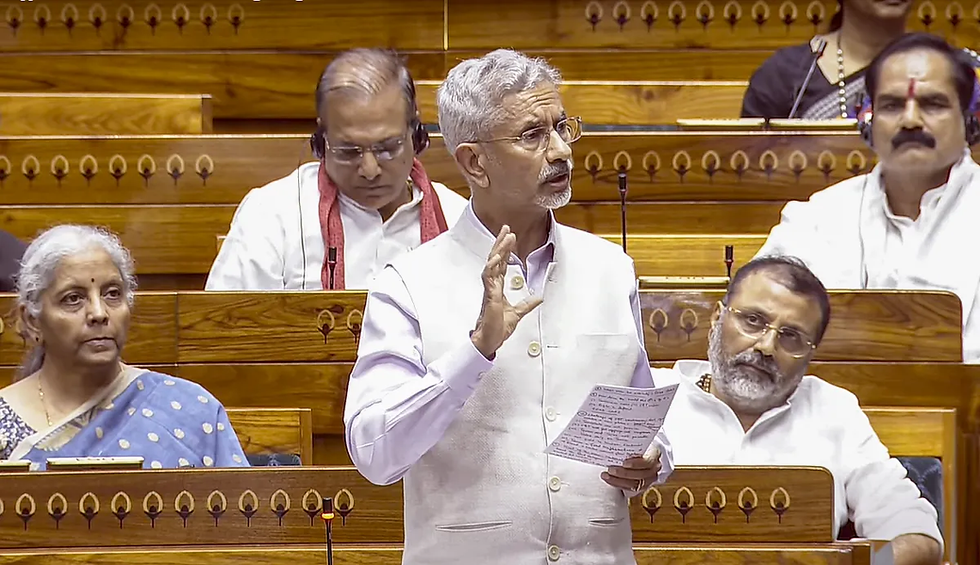Indus Waters Treaty Suspended: India’s Strong Message to Pakistan Over Terrorism
- MGMMTeam

- Jul 30, 2025
- 4 min read
In a landmark declaration in Parliament, External Affairs Minister Dr. S. Jaishankar announced that India will suspend the Indus Waters Treaty with Pakistan until Islamabad puts a complete and irreversible stop to cross-border terrorism. The decision marks a historic shift in India’s foreign policy, demonstrating that national security and civilian lives will not be compromised by outdated diplomatic arrangements.

A Treaty Held Hostage by Terror
The Indus Waters Treaty, signed in 1960 between India and Pakistan under World Bank mediation, has long been viewed as a symbol of rare cooperation between the two nuclear-armed neighbors. However, Jaishankar made it clear in his address to the Rajya Sabha that cooperation cannot be one-sided, especially when Pakistan continues to sponsor terrorism against India.
Referring to the recent Pahalgam terror attack in Jammu & Kashmir, where 26 Hindu pilgrims were brutally killed, Jaishankar said India can no longer justify allowing water to flow to a country that permits the flow of arms and explosives into Indian territory. “Blood and water cannot flow together,” he declared, a phrase that now echoes as the cornerstone of India’s new posture.
The Aftermath of the Pahalgam Massacre
The suspension of the Indus Waters Treaty comes in the wake of Operation Sindoor, India’s sweeping diplomatic and strategic response to the April 22 Pahalgam attack. Investigations linked the attack to the Pakistan-based terrorist group Kashmir Resistance, whose cross-border connections and funding trails point directly to Pakistani soil.
India responded swiftly and firmly. The government shut down the Attari–Wagah border, revoked all Pakistani visas, expelled Pakistani military officers stationed in New Delhi, and escalated military preparedness along the Line of Control. But it is the suspension of the water treaty that sends the strongest signal — that India is done with symbolic diplomacy and is moving toward policy with tangible consequences.
Revisiting History: Nehru, Congress, and Policy Blunders
Jaishankar’s address wasn’t just about current policy — it was also a reckoning with the past. He directly criticized India’s first Prime Minister, Jawaharlal Nehru, for signing the treaty in 1960 without ensuring water security for Indian states like Jammu & Kashmir, Punjab, and Rajasthan. Quoting Nehru’s speech from that era, Jaishankar pointed out how the decision was skewed in Pakistan’s favor, and how it ignored India’s long-term strategic and agricultural interests.
He also took a sharp jab at the Congress party, accusing its members of being silent or evasive whenever India takes bold steps to safeguard its sovereignty. According to Jaishankar, the Modi government is now correcting historical wrongs — just as it abrogated Article 370 to fully integrate Kashmir, it is now asserting India’s rightful claim over its own water resources.
India's Assertive Turn on Water Policy
In recent years, India has steadily increased its efforts to utilize its share of the Indus waters more effectively. Projects to build dams, redirect excess water, and enhance hydropower infrastructure have been under development in Himachal Pradesh, Jammu & Kashmir, and Punjab.
Now, with the treaty officially suspended, these efforts are likely to accelerate. India will no longer allow water to flow freely into Pakistan at the cost of its own farmers and citizens, especially when Pakistan fails to crack down on terror groups operating from its soil. This move not only protects national interests but also challenges the global community to re-evaluate long-standing agreements that fail to reflect modern geopolitical realities.
Taking Terrorism to the Global Stage
India’s approach is not limited to bilateral decisions. Jaishankar highlighted how India has pushed terrorism onto the global agenda at every international forum. Whether at the United Nations, the Shanghai Cooperation Organisation (SCO), BRICS, or the Quad, India has consistently called for a united front against countries that support or shield terrorist entities.
According to Jaishankar, this global pressure is yielding results, with several nations recognizing the duplicity in Pakistan’s approach — claiming to be a victim of terror while sheltering its perpetrators. India’s suspension of the Indus Waters Treaty is intended to reinforce this message: there can be no compromise with terrorism, and those who support it will face consequences.
Conclusion: A New Chapter in India's Foreign Policy
The suspension of the Indus Waters Treaty is not merely a policy decision — it is a strategic declaration of intent. For decades, India adhered to the treaty even during wars and terror attacks, believing in the sanctity of international commitments. But today’s India is no longer willing to suffer quietly in the name of diplomacy.
With this bold move, India has signaled a paradigm shift: that goodwill must be earned, not assumed; that treaties are not shields for those who shed innocent blood; and that national interest and civilian safety come before outdated conventions.
Pakistan now faces a clear choice — either dismantle its terror apparatus or prepare for increasing isolation from India and the world. In suspending the treaty, India is not turning away from peace, but asserting that peace cannot exist alongside terror.
(Sources: India TV News, NDTV, LiveMint)




Comments